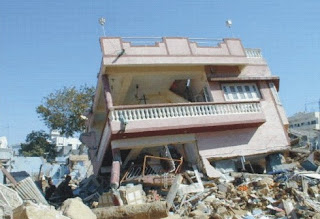EARTHQUAKE
Earthquake, shaking of the Earth’s surface caused by rapid
movement of the Earth’s rocky outer layer. Earthquakes occur when energy stored
within the Earth, usually in the form of strain in rocks, suddenly releases.
This energy is transmitted to the surface of the Earth by earthquake waves. The
study of earthquakes and the waves they create is called seismology (from the
Greek seismos, “to shake”). Scientists who study earthquakes are called
seismologists.
The destruction an earthquake causes depends on its
magnitude and duration, or the amount of shaking that occurs. A structure’s
design and the materials used in its construction also affect the amount of
damage the structure incurs. Earthquakes vary from small, imperceptible shaking
to large shocks felt over thousands of kilometers. Earthquakes can deform the
ground, make buildings and other structures collapse, and create tsunamis
(large sea waves). Lives may be lost in the resulting destruction.
Earthquakes, or seismic tremors, occur at a rate of several
hundred per day around the world. A worldwide network of seismographs (machines
that record movements of the Earth) detects about 1 million small earthquakes
per year. Very large earthquakes, such as the 1964 Alaskan earthquake, which
caused millions of dollars in damage, occur worldwide once every few years.
Moderate earthquakes, such as the 1989 tremor in Loma Prieta, California, and
the 1995 tremor in Kōbe, Japan, occur about 20 times a year. Moderate
earthquakes also cause millions of dollars in damage and can harm many people.
In the last 500 years, several million people have been
killed by earthquakes around the world, including over 240,000 in the 1976
T’ang-Shan, China, earthquake. Worldwide, earthquakes have also caused severe
property and structural damage. Adequate precautions, such as education,
emergency planning, and constructing stronger, more flexible, safely designed
structures, can limit the loss of life and decrease the damage caused by
earthquakes.
